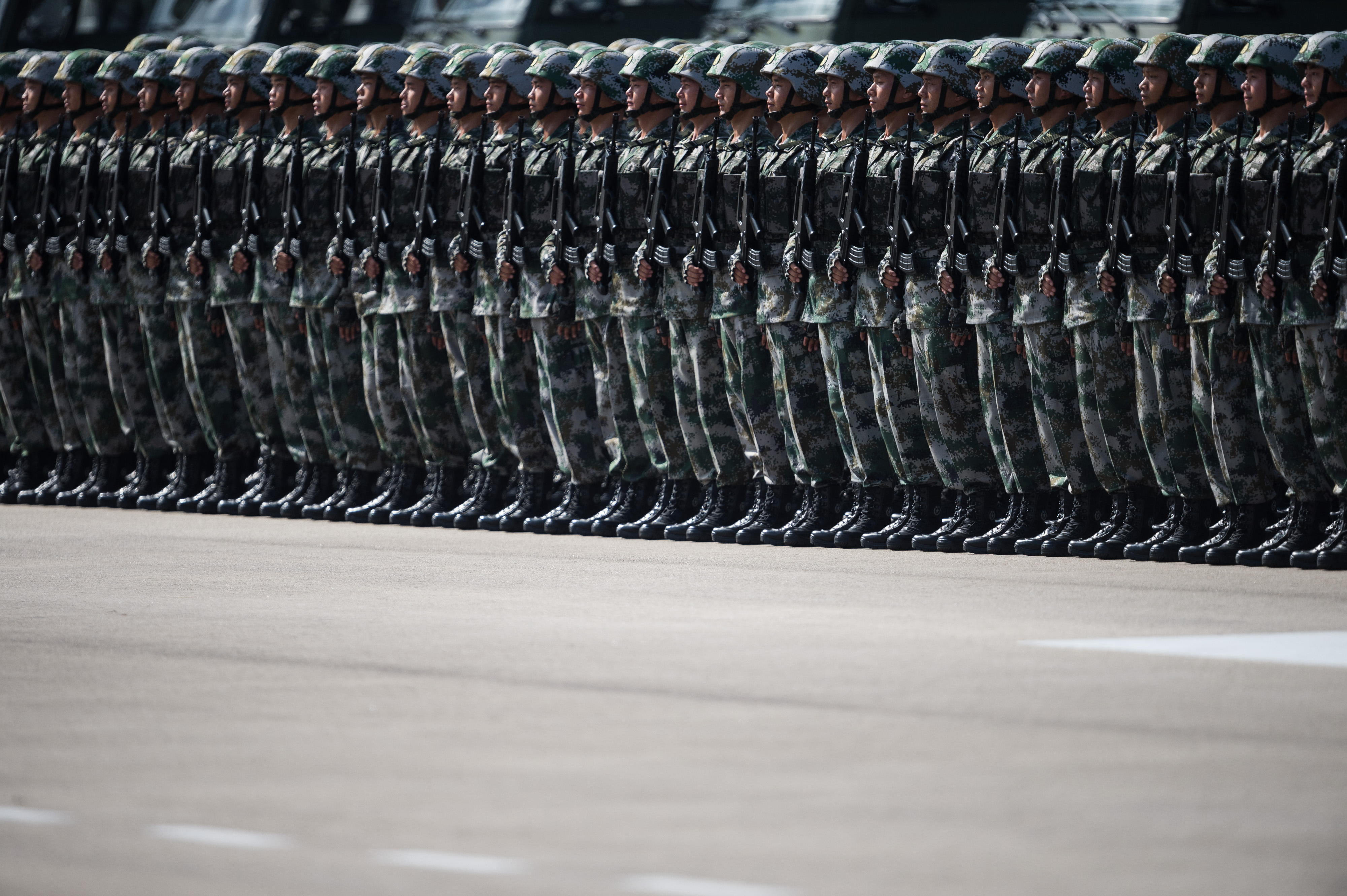The looming threat of Chinese imperialism
With great power comes great temptation


A free daily email with the biggest news stories of the day – and the best features from TheWeek.com
You are now subscribed
Your newsletter sign-up was successful
North Korean dictator Kim Jong Un recently announced a surprise visit to China, where he was welcomed with considerable warmth and vaguely promised that his country would de-nuclearize at some point. It's a small sign of how the center of world politics is shifting away from the United States and towards Asia.
Coincidentally, on that same day Amnesty International released a report on a Chinese mining operation that almost certainly worsened a flash flood that wrecked a small, poor village in Mozambique in 2015. The company Haiyu had been mining titanium, zircon, and ilmenite in the area, and dumping the tailings onto the local wetlands — thus reducing the capacity to absorb heavy rains.
As China matures into a global superpower, matching and someday surpassing the United States in strength, it's worth considering the future risk of Chinese imperialism.
The Week
Escape your echo chamber. Get the facts behind the news, plus analysis from multiple perspectives.

Sign up for The Week's Free Newsletters
From our morning news briefing to a weekly Good News Newsletter, get the best of The Week delivered directly to your inbox.
From our morning news briefing to a weekly Good News Newsletter, get the best of The Week delivered directly to your inbox.
First, a bit of history is in order. Defined broadly, imperialism is the subjugation of a people by a foreign power, and it has been the bane of the last half a millennium. The immediate objective in most cases in history was material gain, and the worst perpetrators were Europeans.
When the Spanish Conquistadors smashed the complex Mayan, Incan, and Aztec societies, and the European diseases they brought killed something like 90 percent of the local population, ensuing Spanish rulers quickly shoved the survivors into silver mines and worked them to death so that nobles and monarchs 5,500 miles away could live in wretched luxury.
In the Congo basin, Belgian King Leopold II directly ruled an area roughly the size of Western Europe through his own private corporation, enserfed the local population, and forced them to produce rubber and ivory by threat of death or mutilation. Perhaps half the population of around 20 million were killed.
Most spectacularly, the U.K. seized a temporary economic advantage to become direct ruler of something like a quarter of the planet. That meant things like forcibly opening up trade with India to provide an outlet for British exports, and when that led inadvertently to an unfavorable trade balance with China, violently forcing mass opium exports on that country to balance the books.
A free daily email with the biggest news stories of the day – and the best features from TheWeek.com
The U.S. is no exception either, especially since it has become the most powerful nation in the world. In Central America in the early 20th century, United States foreign policy was often all but dictated by the needs of the United Fruit Company, which ran several countries as plutocratic dictatorships.
However, it's important to note than in many instances the direct benefits of imperial actions were overwhelmed by the costs of war and administration, especially when the imperial nations have allowed their national pride to get tangled up in the equation. Both the wars in Vietnam and Iraq, for instance — imperialist actions if there ever have been any — did not remotely pay in any accounting sense. Though some defense contractors did make out like bandits, it was at the expense of the rest of the country, who paid in some combination of taxes, inflation, higher deficits, and, of course, blood.
Instead, those wars were mainly about how immense power allowed overseas conflicts to be just another proxy for domestic political squabbles, or one faction's messianic vision. Both the Kennedy and Johnson administrations were almost comically ignorant about Vietnam itself, overlooking the key role usurious landlords played in a peasant society, and instead obsessed endlessly about being red-baited by Republicans and "losing" another country to communism. President George W. Bush thought he could remake a medium-sized country in his own image and split the Democrats in the process.
Both instances were epic, bloody, money-shredding catastrophes — but the United States is so rich that it could absorb the costs without suffering crippling economic side effects.
The conclusion seems to be that imperialism is a live possibility when any country has an immense preponderance of military and economic power compared to others — which brings me back to China.
Chinese overseas investment has skyrocketed over the last decade or so, as the country has reached middle-income status and begun to flex its muscle overseas. Africa especially has been a key destination. A (rather Panglossian) McKinsey report from last year found that China has become the biggest single investor in the continent, with foreign direct investment increasing rapidly and something like 10,000 independent firms there involved in all kinds of business.
However, abundant African raw materials and energy have been the primary focus (to feed China's voracious domestic manufacturing demands), and Chinese firms have proven none-too-scrupulous about the kind of countries they invest in. The result, in many cases, is vicious exploitation or ecological disasters.
But it's not just Africa. China has also invested heavily in Europe, Latin America, and North America. Then there is the "Belt and Road Initiative," a globe-spanning plan to smooth transport in and around Eurasia, so huge that it is already one of the biggest infrastructure projects in world history well before completion. But many of the individual loans have been so improvident — the ones to Djibouti spiked its debt-to-GDP ratio by 85 percent — that future debt peonage or default for many states look likely.
For decades, the Western consensus has been that as China got richer, it would inevitably become more politically free. That appears to be the opposite of true, as Chinese President Xi Jinping has consolidated more personal power than any Chinese leader since Mao Zedong, culminating in the removal of term limits earlier this month. He now seems set to function more or less as dictator-for-life — and at the helm of what will almost certainly be the most powerful country in the world at some point soon.
There's no reason to think that China will be any more scrupulous with the use of imperial force than the U.S. has been, if not considerably worse. Is it any wonder that Kim Jong Un might turn to China and be welcomed there with full pomp and circumstance? Resolving the pointless President Trump-created nuclear standoff under the Chinese aegis would make the visibly tottering United States look like an oafish buffoon. But residents of the North Korean prison state are not likely to receive much in the way of aid or sympathy in return.
Ryan Cooper is a national correspondent at TheWeek.com. His work has appeared in the Washington Monthly, The New Republic, and the Washington Post.
-
 The Olympic timekeepers keeping the Games on track
The Olympic timekeepers keeping the Games on trackUnder the Radar Swiss watchmaking giant Omega has been at the finish line of every Olympic Games for nearly 100 years
-
 Will increasing tensions with Iran boil over into war?
Will increasing tensions with Iran boil over into war?Today’s Big Question President Donald Trump has recently been threatening the country
-
 Corruption: The spy sheikh and the president
Corruption: The spy sheikh and the presidentFeature Trump is at the center of another scandal
-
 The fall of the generals: China’s military purge
The fall of the generals: China’s military purgeIn the Spotlight Xi Jinping’s extraordinary removal of senior general proves that no-one is safe from anti-corruption drive that has investigated millions
-
 Epstein files topple law CEO, roil UK government
Epstein files topple law CEO, roil UK governmentSpeed Read Peter Mandelson, Britain’s former ambassador to the US, is caught up in the scandal
-
 Iran and US prepare to meet after skirmishes
Iran and US prepare to meet after skirmishesSpeed Read The incident comes amid heightened tensions in the Middle East
-
 EU and India clinch trade pact amid US tariff war
EU and India clinch trade pact amid US tariff warSpeed Read The agreement will slash tariffs on most goods over the next decade
-
 Israel retrieves final hostage’s body from Gaza
Israel retrieves final hostage’s body from GazaSpeed Read The 24-year-old police officer was killed during the initial Hamas attack
-
 China’s Xi targets top general in growing purge
China’s Xi targets top general in growing purgeSpeed Read Zhang Youxia is being investigated over ‘grave violations’ of the law
-
 Panama and Canada are negotiating over a crucial copper mine
Panama and Canada are negotiating over a crucial copper mineIn the Spotlight Panama is set to make a final decision on the mine this summer
-
 The app that checks if you are dead
The app that checks if you are deadIn The Spotlight Viral app cashing in on number of people living alone in China
